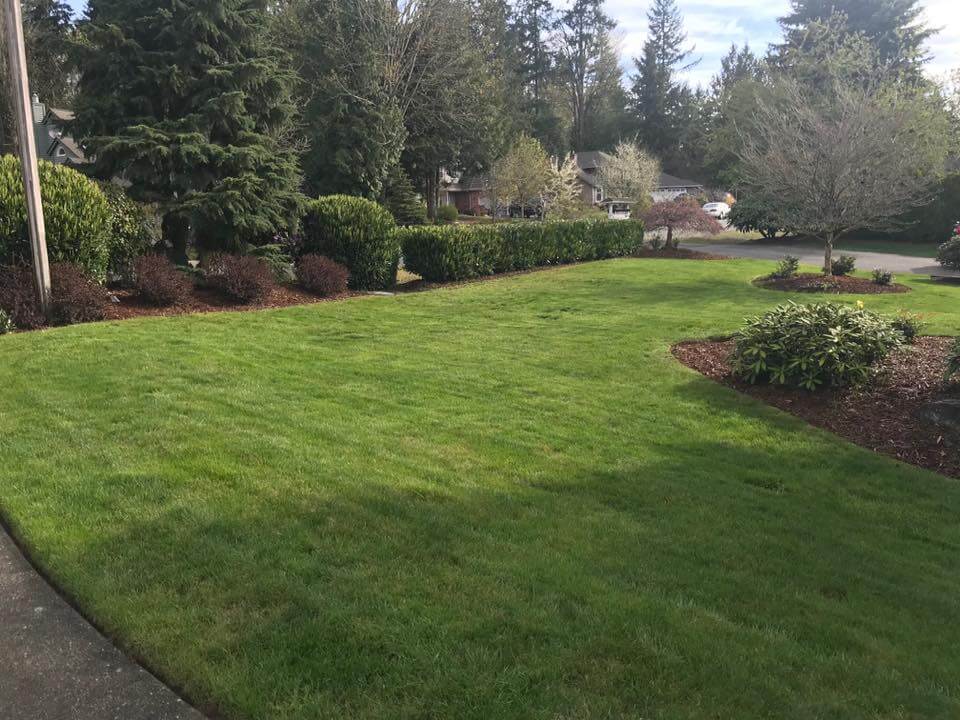
Summer has arrived. We expect temperatures in the 80s by next week. Follow these tips for summer lawn health to help your lawn perform well during the hot, dry season.
Why should you water your lawn in summer?
Some people stop watering their lawn in summer, thinking they will save precious water and it won’t harm your lawn. But lawns need water in the summer.
1. Reduce problems with weeds
If you have weeds in your lawn and you cannot stand it, the worst action you can take is to let your lawn go dormant. During summer, weed seeds blow in.
Dandelions, false dandelions, clover, oxalis, plantain and many other weeds like the hot, dry weather. They are still functioning, putting out more roots and producing more seeds while our lawns are quiet. If you have weeds and you let your lawn go dormant, you will always have weeds.
2. Maintain lawn health
If you don’t water your lawn at all in summer, it will become thin and unhealthy. And you will have bare spots where it has died out. All dormant areas are ripe for weeds to get established and take over when rains return in the fall.
3. Help your lawn recover from insect problems
If your lawn has been invaded by insects such as crane flies or chafer beetles, you need to continue regular watering, at least an inch a week. Keeping your lawn green and healthy will help it outgrow any insect damage.
How to water for summer lawn health
Water one inch of water each week. This will keep the lawn growing and healthy.
Water once or twice a week. This is much better than watering daily. Watering less frequently will encourage the lawn to grow deeper roots, making it more resilient.
Deep roots are the key. A lawn will need less water in summer if you have taken steps earlier in the growing season to improve its health. If roots are growing deeply into the soil, it does not take a lot of water to keep a lawn growing. The shorter the roots in the lawn, the quicker the lawn will go into a dormant state at the first signs of dry weather.
Low-traffic areas may need less water. You may be able to reduce watering in areas of the lawn that don’t see much traffic. But you still need to water your lawn occasionally to keep it alive. Your lawn will need an inch of water at least once a month to provide some resiliency for the plants.
Here is a short video about how to measure one inch of water from your sprinkler.
Mow your lawn taller for summer lawn health
Lawns will perform better in summer if they are mowed taller. Three inches tall is the most beneficial height during hot summer months.
The taller grass shades the soil. This reduces evaporation, reducing the lawn’s water needs. It also makes it more difficult for weeds to work their way up to the sunlight. And it allows plenty of leaf blade to perform photosynthesis, keeping the lawn healthy.
How to keep your lawn healthy year-round
A healthy, thick, vigorous lawn is the number one weed control strategy for a natural lawn. Letting a healthy lawn outcompete the weeds is how Mother Nature works. But only if your lawn is a living, thriving weed barrier.
Organic fertilizer. To keep a lawn healthy, you need to feed it a few times during the growing season with an organic, slow-release fertilizer. Organic fertilizers feed your lawn slowly over time. They also add organic matter to the soil. This increases the soil’s biological activity and builds soil health.
Mulch mowing and top dressing with compost also add organic matter and nutrients to the soil. Mulch mowing can reduce fertilizer needs by as much as 25 percent.
Mechanical aeration is helpful to reduce soil compaction and allow air an water to reach the root zone. Aeration stimulates root growth and improves the uptake of fertilizer and water. It makes your lawn more tolerant of heat and drought stress. Spring and fall are the best times to aerate a lawn.
Overseeding after aeration will fill in thin spots. This thickens the lawn, so weeds and moss have a difficult time getting established.
We can help you grow a healthy lawn
If you are an In Harmony lawn care client, we have fed your lawn a few times this year, and we may have aerated and overseeded it. If you are not a client and would like your lawn to be healthier and more attractive, contact us for a free quotation.
